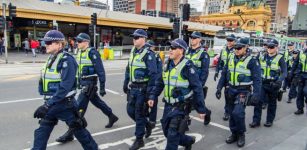Is the AFP Partly Responsible For the Deaths of Chan and Sukamaran?

Australians were outraged by the execution of ‘Bali Nine’ members Andrew Chan and Myuran Sukumaran in Indonesia on 29 April this year.
Many were equally appalled that their deaths might have been avoided if the Australian Federal Police (AFP) had arrested, or at least approached, members of the Bali Nine here in Australia rather than allowing them to get on a plane to Indonesia and then tipping-off Indonesian authorities that they were planning to import drugs from Indonesia to Australia.
In the wake of the executions, one radio host stated that “the Australian Federal Police made an appalling error” and “the Australian Federal Police effectively has blood on its hands this morning”.
That view echoes the sentiments of many others, including the father of another Bali Nine member Scott Rush, whose lawyer-friend Robert Myers called the AFP expressing his concern that Rush was planning to travel to Indonesia to import drugs.
The AFP guidelines have been under close scrutiny over the past few months, and the organisation is now at the centre of a Parliamentary investigation.
The AFP will be asked to explain its role in allowing the Australians to make their way to Indonesia rather than approaching or arresting them, when they had information that the Australians were planning to import drugs from Indonesia to Australia.
Successive AFP spokespersons have declined for years to comment on why they didn’t approach or arrest the men in Australia before they left, when there was adequate time to do so.
But one AFP member recently claimed that police simply did not have enough evidence to perform an arrest – which is a highly questionable assertion given that police in Australia merely need a ‘reasonable suspicion’ to arrest someone for a criminal offence, such as conspiring to import drugs. This is a low threshold – far lower, for example, than the ‘probable cause’ test required for arrests in the US.
What are the guidelines?
The current guidelines have been in place since 2009. This means that they are not the original guidelines which were in place when Bali Nine members were caught in possession of drugs in 2005.
The 2009 guidelines state that the AFP is authorised to provide assistance and cooperate with foreign law enforcement agencies.
Before providing any information, however, he AFP must consider whether the assistance might lead to Australians facing the death penalty.
However, the possibility of the death penalty does not automatically mean that information cannot be shared.
Rather, the AFP will consider that possibility amongst a host of other factors, including:
- The purpose of providing the information and how reliable the information is;
- The age and personal circumstances of the person involved;
- Any potential risks to the person and others, if the information was provided and not provided;
- Australia’s interest in promoting cooperation with overseas agencies in combating crime.
In the aftermath of the deaths of Chan and Sukumaran, many have called for the revision of these guidelines to ensure that other Australians are not executed following tip-offs by Australian police.
Parliament
On the one hand, Opposition Leader Bill Shorten has expressed the view that it may be time for AFP guidelines to be tightened in relation to potential death penalty prosecutions.
On the other, Foreign Minister Julie Bishop has stated that the government is satisfied with the current guidelines.
Clive Palmer has even chimed-in on the debate, foreshadowing the introduction of a private member’s bill which would make it a criminal offence punishable by up to 15 years imprisonment for public officials to share information that leads to the execution of Australians overseas.
Senator Nick Xenophon has been more reserved, stating that “it is not about recrimination – it is about making sure that this never happens again.”
Australians on death row
Chan and Sukumaran are the first Australians to have been executed overseas in almost a decade.
And while we all know their names, there are currently several other Australians on death row, including Pham Trung Dung, Henry Chin and Bengali Sherrif.
Pham Trung Dung is currently in Vietnam facing the death penalty for possessing more than 4kg of heroin, which authorities say he was attempting to import from Ho Chi Minh City to Australia in 2013.
Henry Chin was arrested in China trying to transport drugs into Australia. He had attempted to send methamphetamine from China to Australia in 2005 and was sentenced to death.
Bengali Sherrif and Ibrahim Jalloh were arrested in China in June 2014 attempting to smuggle methamphetamines back to Australia.
It is understood that Sherrif has been sentenced to death while Jalloh has yet to face trial.
The deaths of Chan and Sukumaran have, if anything, reminded us of the senseless injustice of executing people who had been remarkably rehabilitated.
In light of their fate, many Australians are of the view that AFP guidelines and procedures need to change to ensure that this never happens again.






